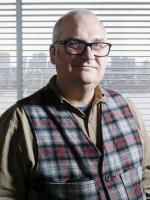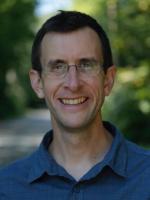PAOC Spotlights
PAOC Faculty Promotions
Congratulations to Michael Follows and David McGee for their recent promotions, recognizing their achievements and contributions to the department.
Effective July 2017, Michael Follows will become a Full Professor and David McGee, an Associate Professor within MIT’s Program of Atmospheres, Oceans and Climate (PAOC), which is part of EAPS.
 Michael (Mick) Follows came to MIT in 1992 as a postdoc, later joining the Department of Earth, Atmospheres and Planetary Sciences faculty in 2013, and assuming a secondary appointment within Civil and Environmental Engineering. But before arriving on campus, Follows pursued advanced degrees in atmospheric science at the University of East Anglia, studying the circulation of atmospheric ozone between the stratosphere into the troposphere. Here, Follows saw parallels in how ozone moved downward in the atmosphere and how nutrients cycle upward to the surface in the ocean, and later joined John Marshall’s group at MIT working on tracer oceanography and biogeochemical cycles.
Michael (Mick) Follows came to MIT in 1992 as a postdoc, later joining the Department of Earth, Atmospheres and Planetary Sciences faculty in 2013, and assuming a secondary appointment within Civil and Environmental Engineering. But before arriving on campus, Follows pursued advanced degrees in atmospheric science at the University of East Anglia, studying the circulation of atmospheric ozone between the stratosphere into the troposphere. Here, Follows saw parallels in how ozone moved downward in the atmosphere and how nutrients cycle upward to the surface in the ocean, and later joined John Marshall’s group at MIT working on tracer oceanography and biogeochemical cycles.
As time went on, Follows became increasingly interested in the biological components of oceanography, recalled Marshall, the Cecil and Ida Green Professor of Oceanography in EAPS. But it was one particular project catalyzed it his shift into biochemistry and ecology: One of his graduate students began modeling nitrogen-fixing phytoplankton communities, when Follows realized that he could use trait-based modeling and incorporate Darwinian aspects of organism competition and fitness into oceanography and ecosystems simulations. This revolutionary concept propelled Follows to the fore of the biogeochemical oceanography field and the subsequent findings from this new line of research has helped shape Follows’ career into what it is today.
Currently, his research digs into the physical and biogeochemical drivers that shape the structure and function of marine microbial communities, as well as regulate the oceanic cycles of carbon and nutrients on global and climate scales. In order to tackle these scientific issues, Follows and his group employ theory, numerical models and observed data to identify and probe the relationships that microbes and their communities have with their environment and how their responses feed back into the system. They examine these interactions at multiple degrees of modulation, from the cellular level to global arrangements. These include traits and trade-offs, costs and benefits of microbial function.
A manifestation of this is the Darwin Project, which Follows leads. The project brings together MIT physical oceanographers, biogeochemists and marine microbiologists in order to couple state of the art physical, global ocean circulation models with biogeochemistry and genome-informed models of microbial processes, revealing feedbacks that they have on each other. Since its launch, the models have become increasingly sophisticated, incorporating thousands of plankton species, viruses and biogeochemical processes into physical ocean models. Using these, a recent investigation found that, “ocean bacteria can survive on oxygen concentrations as low as approximately 1 nanomolar per liter. To put this in perspective, that’s about 10,000 times lower than what most small fish can tolerate and about 1,000 times lower than what scientists previously suspected for marine bacteria.” Another study suggests that tiny mixotrophs (e.g. plankton) increase the ocean’s carbon-storing efficiency, which then enhances the sea’s efficiency to sequester carbon dioxide.
“Mick is very innovative thinker and has transformed the way we consider the role that biology plays in Earth’s climate system,” said Raffaele Ferrari, the Cecil & Ida Green Professor of Oceanography at MIT and Chair of the Program in Atmospheres, Oceans and Climate (PAOC).“Appointing him to the faculty has brought much needed breadth to our educational program. Thanks to Mick, we have proudly expanded our Climate Physics and Chemistry degree program to train students in all aspects of climate science including biology, and have changed its name to Climate Science.”
Additionally, Follow’s work throughout his career has earned him recognition: American Academy of Microbiology Fellow, the MIT Global Habitat Longevity Award, and Royal Society European Exchange Post-doctoral Fellowship.
 David McGee, the Kerr-Mcgee Career Development Assistant Professor in EAPS, joined the faculty in 2012 and will become an Associate Professor later this year. Before arriving at MIT, McGee earned his doctorate from Columbia University in Earth and Environmental Sciences, and a Masters from Tulane University.
David McGee, the Kerr-Mcgee Career Development Assistant Professor in EAPS, joined the faculty in 2012 and will become an Associate Professor later this year. Before arriving at MIT, McGee earned his doctorate from Columbia University in Earth and Environmental Sciences, and a Masters from Tulane University.
McGee’s work tries to understand how the Earth’s atmosphere has responded to past climate changes, specifically precipitation and wind patterns. As a paleoclimatologist, McGee investigates the historical climate system by reconstructing it, focusing on the mean state of dryland hydrology and the rates of climate change. His group does this by sampling “natural archives” like stalagmites, lake deposits, ice cores and marine sediments; looking at their geochemical signatures, often using uranium-thorium dating; and evaluating the measurements alongside models and current theories. McGee and his group’s work provides insight into the characteristics of historical hydroclimate changes, such as patterns, the pace and magnitude.
“The paleoclimate record is this rich natural laboratory for understanding the Earth’s climate at the broadest scale—really testing our understanding for how the climate system works,” McGee said in a talk at MIT last year.
Much of this research centers around three major themes: paleohydrology, past dust emissions and transport and flux records from marine sediments. He’s been focusing on the evolution of aridity and precipitation in now desert regions like the Sahara, closed-basin lakes like the Great Basin in the American West, and the intertropical convergence zone (ITCZ).
Additionally, McGee is fascinated with dust. Not only can McGee look at dust deposits and amounts and, working with modelers, figure out where it came from, when and what climate correlates with those conditions, but he uses it as an active tracer in the climate system as well. Dust actively impacts the climate—redepositing minerals to support ecosystems in the ocean, blocking sunlight, nucleating clouds, etc. All of this reinforces and provides feedback on other features of the climate system, like circulation patterns and sea surface temperatures. With these robust chronologies, McGee and his team can compare this with other records and build a global picture of Earth’s climatological past.
A recent study by McGee and his co-authors found that around 11,000 years ago, there was a large reduction in dust plumes, which emanated from the Sahara Desert; this, in turn, allowed sunlight to reach the ocean and warm it, and affect wind and precipitation patterns over North Africa. The likely result was an increase in monsoons over the region. Last year, research from McGee and his colleagues revealed that forest loss from Madagascar 1,000 years ago was due to blazes set by humans. The group discovered this after examining nearby stalagmites, which showed a dramatic chemical shift indicative of a change in plant life, not caused by climate change. Other work investigated changing levels of desert dust, which is one of the only sources of oceanic iron, on the nutrient’s concentrations in surface seawater, and how phytoplankton would be affected. McGee’s research found that the mineral does not last long in the surface waters, thereby making phytoplankton extremely sensitive to changing levels of dust.
“David combines an excellent intuition for identifying the hidden signatures left by past climates in Earth’s paleorecord with a passion for understanding the physics that generated those past climates,” said Raffaele Ferrari, the Cecil & Ida Green Professor of Oceanography at MIT and Chair of the Program in Atmospheres, Oceans and Climate (PAOC).“His fluency in both the language of geology and climate dynamics has strengthened the paleoclimate program by bringing together EAPS geologists and physicists to tackle some of the most pressing questions about Earth’s climate.”
In addition to McGee’s exceptional teaching, he directs Terrascope, a learning program for MIT freshmen that works to solve complex, real-world problems facing the planet. Jointly operated by the Department of Earth, Atmospheric and Planetary Sciences (EAPS) and the Department of Civil and Environmental Engineering, Terrascope asks students to tackle multivariable engineering issues, while considering ethical, economic, social, environmental and political questions and perspectives. These “Missions” change yearly and have included maintaining biodiversity and human ecological impacts, saving global fish populations and marine ecosystems from collapse while supporting the fishing industry, and designing a plan to feed the planet for the next century.
One mission is particularly personal for McGee: Can we fix New Orleans? This challenge asks students to develop and articulate a comprehensive plan for the long-term future of New Orleans in the aftermath of Hurricane Katrina, a storm that killed residents, flooded the city and caused billions of dollars in damages. Before coming to MIT, McGee was working on a degree at Tulane University when the storm hit, causing his family to evacuate and destruction to his home. After returning he saw disparities between how people were able to cope with the disaster—those with stronger safety nets would largely recover, while those with weaker ones would suffer more greatly. Reflecting, McGee feels that as climate scientists and people with, perhaps, stronger safety nets, we have a responsibility to reduce the risks that people around the world face from climate change.
The success of the Terrascope program has been recognized by the National Academy of Engineering (NAE) Center for Engineering Ethics and Society (CEES)as an Exemplar in Engineering Ethics Education, which highlights "programs and strategies for improving engineers' understanding of ethical and social issues."
McGee has also earned several awards, positions and grants for his work, including the Kerr-McGee Career Development Assistant Professor since 2015, MIT’s Ally of Nature Fund, MIT’s Earl Killian and Waidy Lee Fund, NOAA Climate and Global Change Postdoctoral Fellow, NSF Graduate Teaching Fellow, NSF Graduate Research Fellow, and Phi Beta Kappa.
Learn more:
Video: At the intersection of biology and physics in the ocean
Bringing Life to Computer Models of Marine Microbes
Video: Climate Science at MIT: 2. Climate History of Earth: Prof David McGee (January 2016)
Video: MIT Technology Day 2016: David McGee
Research Takes Center Stage at MIT Climate Conference